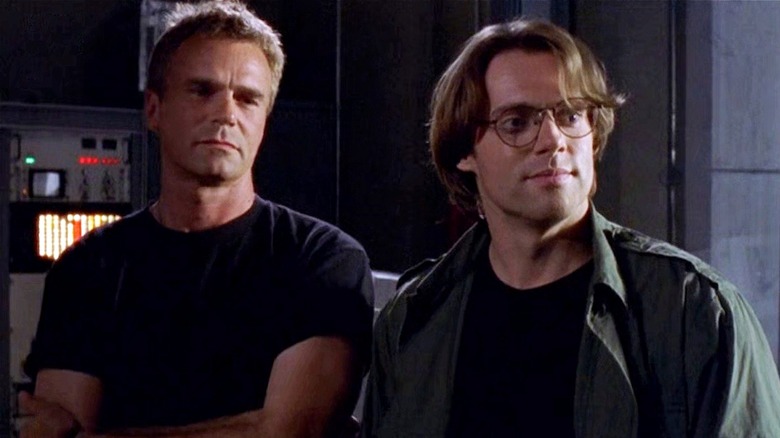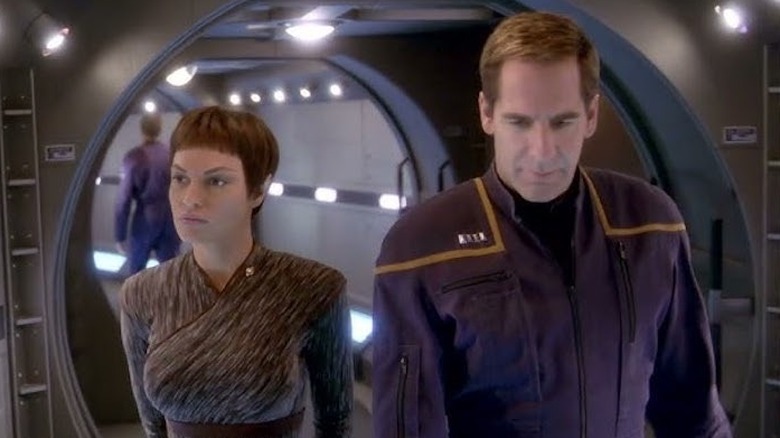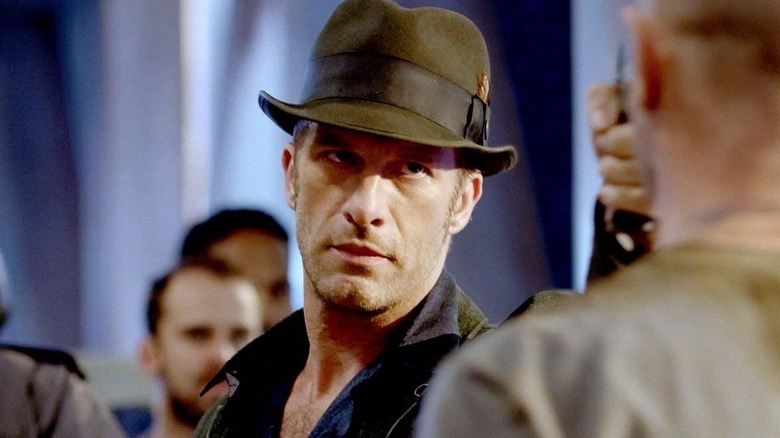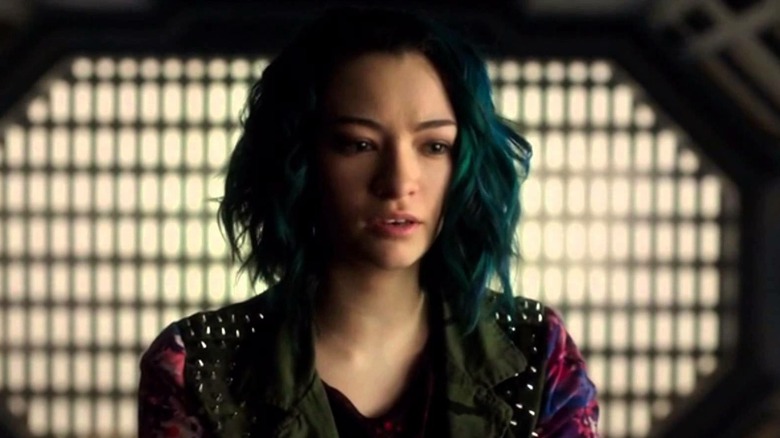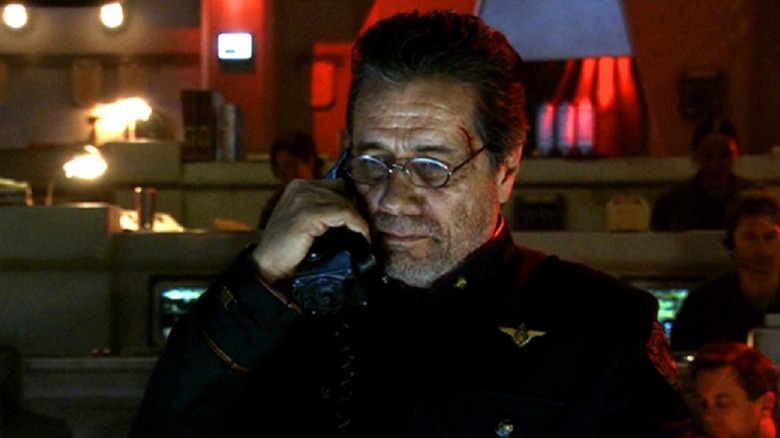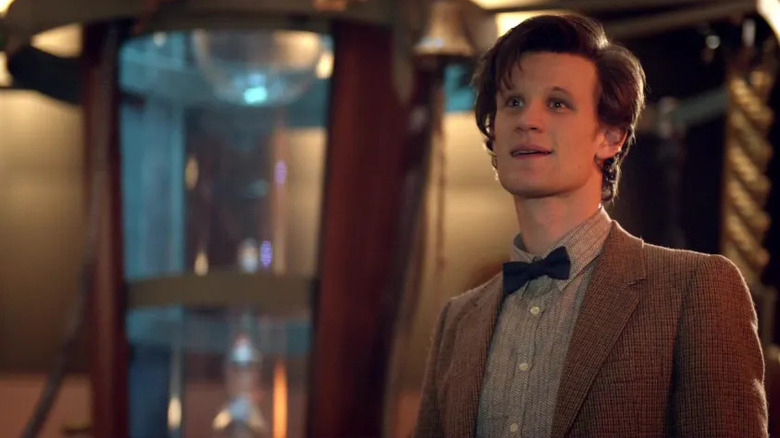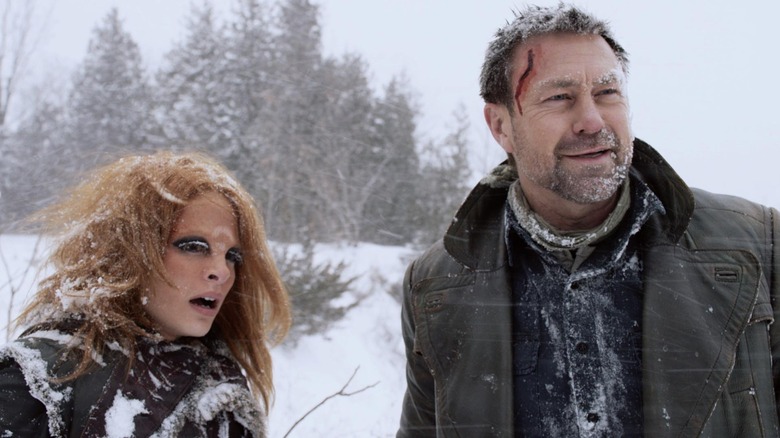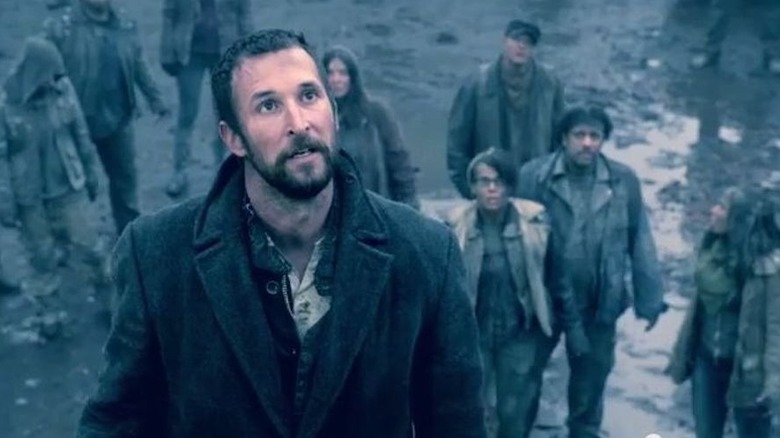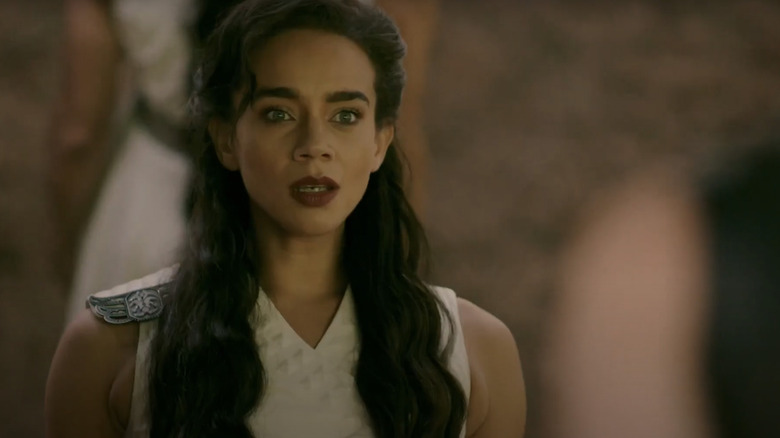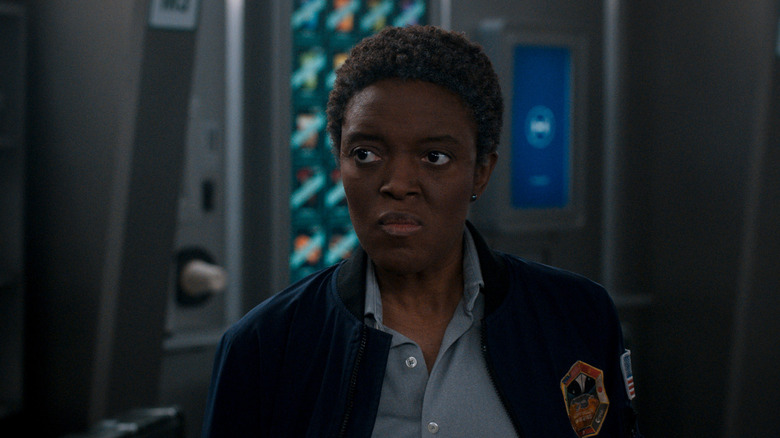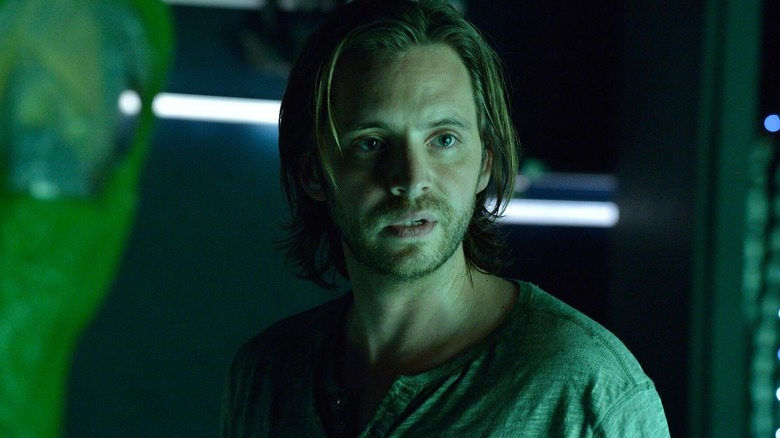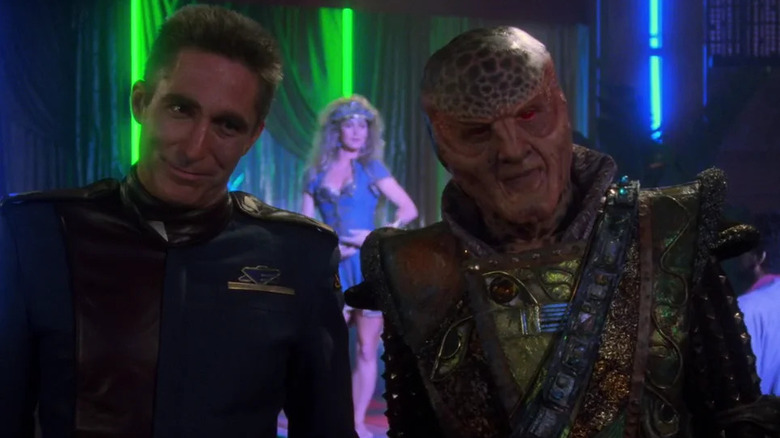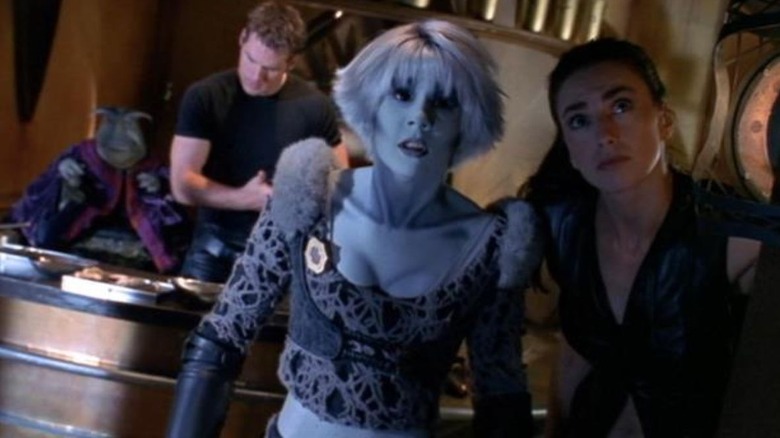12 Best Shows Like Stargate SG-1
Roland Emmerich and Dean Devlin had their first major hit in 1994 with the sci-fi action movie "Stargate." Instead of a sequel, it got a TV spin-off in 1997, "Stargate SG-1," which proved more successful than any movie follow-up could have been. Running 10 seasons, "SG-1" yielded two TV movies and four spin-offs of its own.
"SG-1" stars Richard Dean Anderson as Colonel Jack O'Neill, who heads up a special team at Stargate Command, a secretive military base that houses a portal to outer space. These portals are discovered at various locations around the world, and O'Neill and his team use Stargate SG-1 to explore the furthest reaches of the galaxy. But their exploration comes at a price: using the Stargate quickly leads to conflicts with dangerous alien races like the Goa'uld, forcing them to make allies in deep space to defend Earth from an interstellar war.
Brimming with social commentary like any good science fiction story, "Stargate SG-1" puts forth a world where humanity struggles to integrate with a larger, more complicated galaxy, and the political ramifications that result. But it's not the only TV show of its kind, so without further ado, here's a list of the 12 best shows like "Stargate SG-1."
Star Trek: Enterprise
"Stargate" is set in a world where humanity has discovered a portal to a far-off world. That may remind some of "Star Trek: Deep Space Nine," with its wormhole to the Gamma Quadrant, but if you're looking for the "Trek" series that's most like "Stargate," it's the prequel series, "Enterprise." Set in 2151, the series follows humanity before the formation of the vaunted United Federation of Planets.
The series begins with the launch of Earth's first Warp 5 vessel, the NX-01 Enterprise, under the command of Captain Archer (Scott Bakula). With its experimental new engine — created by Archer's father — it suddenly becomes possible to reach distant stars in mere days, rather than months or years. But their space program is hindered by the Vulcans, who have been overseeing Earth's progress ever since they made first contact with humankind less than a century earlier. With a Vulcan first officer (Jolene Blalock) forced upon them, tensions on the ship are high as they explore strange new worlds.
A series that gave "Star Trek" a fresh coat of paint, "Enterprise" puts an intrepid group of explorers on their back foot in the earliest days of interstellar exploration. With no starbases, few allies, and more primitive technology, the crew often finds themselves the underdogs against dangerous alien adversaries like the Klingons and Romulans. Despite a controversial finale, it might be the most underrated "Trek" series.
The Expanse
If the world of "Stargate SG-1" evolved another 100 years or so, we might get something that looks like the SyFy original series "The Expanse." The show takes place in a future when every planet in the solar system has been colonized by humanity, but they don't always get along. Different political factions fight and feud, extending our petty Earth rivalries into space.
In "The Expanse," we meet a solar system in turmoil as powers like the United Nations of Earth and Luna, the Martian Congressional Republic, and the Outer Planets Alliance all jockey for position. Tensions between them are at a boiling point, but beyond the great military powers, there remain lawless regions where crime runs rampant. That's where we meet grizzled space detective Joe Miller (Thomas Jane), who, during an investigation into a missing persons case, quickly finds himself embroiled in a political conspiracy that could bring down the fragile peace between cosmic powers.
An outer space detective story of sorts, "The Expanse" is one of the better sci-fi dramas of the past decade, even proving so popular that it was rescued from cancellation by Prime Video in 2018, where it received an additional three seasons. All told, there are six seasons to watch, and with rave reviews, it might be the best entry on this list.
Dark Matter
"Dark Matter" takes the space adventure of "Stargate SG-1" and tosses in an ongoing mystery. The starship Raza has apparently been drifting aimlessly through space while its crew has been in suspended animation. But when the six occupants wake from their stasis pods, they're bewildered to learn that they are all suffering from near-total amnesia.
Numbering themselves One through Six, the otherwise nameless crew of the Raza have no idea who they are, how they got aboard the Raza, or what their mission might have been. So they set out on a desperate journey for answers to their many questions. But they also discover that the galaxy they find themselves in is a hostile one, with enemies lurking behind every asteroid. With little to go on, they set out looking for clues to their origins, and soon must deal with shocking revelations about their past that only seem to make things worse.
An expertly told sci-fi thriller, "Dark Matter" is a spectacular but frustrating watch. That's mostly due to its surprise cancellation after its third season: unlike "The Expanse," there was no streamer swooping in to give it a proper conclusion, leaving its ending a terrible disappointment to longtime fans. While there's been persistent talk of a revival, we may never know how it would have ended.
Battlestar Galactica
"Battlestar Galactica" is a reinvention of a 1978 sci-fi show that flopped horribly. Rebooted with a more adult tone, it became a huge hit, and its military flavor will remind many of "Stargate SG-1." Created by former "Star Trek" scribe Ronald D. Moore, "Battlestar Galactica" launched in 2003 as a TV miniseries, introducing an interstellar human society comprised of a dozen worlds known as the 12 Colonies of Kobol.
In a devastating sneak attack, the colonies are decimated by the deadly Cylons, a race of insidious robotic rivals who want humans wiped off the face of the galactic map. The few survivors, on a flotilla of spaceships led by the Battlestar Galactica under the command of Admiral William Adama (Edward James Olmos), band together to save humanity from total annihilation. Alone and lost in outer space, the refugees' mission is to find the long-lost thirteenth Colony of Kobol: Earth. At the same time, they discover that the Cylons have evolved, and can now take human form — meaning that anyone among them could be a traitor in disguise.
Blending together elements of sci-fi military action, political intrigue, and survivalist drama, "Battlestar Galactica" transcends the genre with a slowly unfolding mystery as the crew of the Galactica grapples with the fear of Cylons in their midst. A gripping drama consisting of six seasons and a TV movie — plus a prequel series, "Caprica" — "Battlestar Galactica" is among the best sci-fi TV shows of all time.
Doctor Who
Looking for a series like "Stargate SG-1" that you can watch with your kids? Try "Doctor Who," the iconic British sci-fi series that, believe it or not, has been on the air for the majority of the past 70 years. The series has something for everyone, from happy-go-lucky space adventures to gritty sci-fi mysteries and everything in between. And with a mode of transportation that can zip through both time and space, every episode is like stepping through a different stargate each week.
For the uninitiated, "Doctor Who" revolves around a mysterious, unnamed adventurer known only as the Doctor. He's a seemingly ageless and timeless alien being whose race, known as the Time Lords, can regenerate into a new body after death, which is what has allowed the series to continue for over half a century as new actors playing the Doctor come and go with regularity. With the help of various companions, the Doctor travels to distant far reaches of the universe and back again, as well as both the past and the far future, allowing him to visit historical events on Earth and beyond.
A series that is simply pure joy, even in its grimmer installments, "Doctor Who" has been reinvented and relaunched with a different style and tone so many times, you're guaranteed to find stories you'll love across its 40+ seasons — and you can find a list of the best right here.
Defiance
"Stargate SG-1" kicked off a massive franchise that included spin-offs like "Stargate: Atlantis" and "Stargate: Universe." Though it didn't get any TV spin-offs, "Defiance" is just one part of a bigger franchise, launched simultaneously with a massively multiplayer online video game of the same name. Easily enjoyed separately, they form a bigger web of complex stories when enjoyed in tandem, exploring a future world where alien races have integrated with humanity.
The series begins just as years of Earthly conflicts are coming to an end, originally sparked by the arrival of seven different alien races seeking a new home. After decades of struggle, humanity has been split into nation-states that include the human-centric Earth Republic. Meanwhile, on the West Coast, we find the city known as Defiance, where aliens and humans live together. It's here that Joshua Nolan (Grant Bowler) suddenly finds himself in charge after stopping a diabolical alien terrorist from obliterating the city.
A series whose big budget can be seen on screen, "Defiance" is more or less a sci-fi procedural as Nolan — the new sheriff in Defiance — struggles to maintain order. Sadly, it only lasted three seasons, despite strong reviews, but at least this one ended with a proper conclusion this time.
Falling Skies
Ever wonder what would happen if aliens were successful in an all-out invasion of Earth when the stargates were first discovered in "SG-1?" Look no further than "Falling Skies," a dystopian, post-apocalyptic sci-fi adventure series that revolves around the aftermath of an alien invasion of planet Earth. Shot in a hand-held documentary fashion, "Falling Skies" is something a bit different than most, with a unique sensibility that often makes it feel like a true window into another world.
Six months before the show begins, aliens invade Earth and wipe out most of humankind in a devastating attack, leaving just 700 million people alive. That might seem like a lot, but with scattered survivors around the globe, there is little in the way of an organized resistance left. When former history teacher Tom Mason (Noah Wylie) meets up with a ragtag militia, they begin to lay the seeds for an Earth rebellion, with hopes of toppling the alien empire.
Thanks to a stellar producing team that included Steven Spielberg, "Justified" creator Graham Yost, and "Battlestar Galactica" executive producer David Eick, "Falling Skies" is an alien invasion story like no other. It posits a world much like "Stargate," but where our discovery of alien life has nearly led to the end of the world.
Killjoys
"Stargate SG-1" dialed back the action a bit when it took the movie to the small screen. But if you want a series that isn't shy about space-based action, with laser gun shoot-outs and more, check out "Killjoys," led by "Thunderbolts*" star Hannah John-Kamen. She's supported by a cast that also includes "X-Men" alum Shawn Ashmore and "Mercy Street" headliner Luke McFarlane.
The trio play mercenaries working for the Reclamation Apprehension Coalition in a future where humanity has reached the stars, but brought its penchant for violence with it. The team of dedicated bounty hunters works missions for the RAC, hunting criminals, serving warrants, and repossessing stolen property in The Quad, a system of four planets with its own unique laws, rules, and regulations. There is plenty of political turmoil in the Quad, though, with a number of conflicts unsettled, but the team tries their best to navigate the landscape as neutral parties — though that's rarely possible.
A throwback to more lightweight sci-fi adventures, "Killjoys" has the same adventurous spirit as "SG-1." Populated by heroes that are easy to root for and villains that you love to hate, it serves as a reminder that sometimes sci-fi doesn't have to be dystopian — it can also be a lot of fun. And with "Killjoys," you'll have five seasons of excitement to watch.
For All Mankind
The most recent entry on our list, "For All Mankind" is something a bit different than the typical sci-fi fare. While "Stargate SG-1" takes place in a world where humankind can travel instantly to deep space, "For All Mankind" goes back in time to envision a past where the space race of the 1960s never ended — leading to a story that spans decades and sees humanity soaring to the stars in the 1980s and '90s.
Another sci-fi series from "Star Trek" writer Ronald D. Moore, "For All Mankind" begins in 1969, when instead of Neil Armstrong, it's Russian cosmonaut Alexei Leonov who is the first man to set foot on the moon. With that one change to history, the next few decades are very different than how we remember them, as both the American and Russian space programs race forward, leading to an explosion of technology that ends the climate crisis, puts humans on Mars, and beyond.
Subsequent seasons of the series jump forward in time, with stories set in the '80s, '90s, and 2000s. But because the world is a very different place, the contemporary settings seem like science fiction, much like the world of "Stargate: SG-1." Still, if you're looking for a more grounded and serious sci-fi drama, "For All Mankind" is it.
12 Monkeys
Based on the 1996 sci-fi thriller from "Monty Python" alum Terry Gilliam — which was in turn loosely based on a short French film called "La Jetée" — the SyFy original series "12 Monkeys" is a lot like "Stargate SG-1" if it were all about traveling through time instead of space. We see the Earth government using a portal into the past to save the human race after a deadly plague wipes out most life on Earth. To do it, they send James Cole (Aaron Stanford) back in time to find the source of the virus in the hopes of developing a cure in the future.
In the past, however, matters became more complicated when Cole discovers that a terrorist group known as the Army of the 12 Monkeys may have been involved in the creation of the virus. To find answers, he'll need help in the past, which he gets from Dr. Cassandra Railly (Amanda Schull) and eccentric oddball Jennifer Goines (Emily Hampshire). Unlike the film, the TV series flips back and forth between the future and the past, with new factions introduced like the rebel group known as West VII, who have no interest in saving humanity.
Created by Terry Matalas — who was recently tapped to showrun Marvel's "Vision Quest" series on Disney+ — "12 Monkeys" is a soaring story of humanity's attempt to understand something seemingly beyond its control, not unlike "Stargate SG-1." It's also one of the best movie-to-TV reboots ever made.
Babylon 5
There's been debate for years about whether "Babylon 5" ripped off the concept of "Star Trek: Deep Space Nine" or the other way around, or whether their similarities were just the result of parallel thinking. Still, you'll enjoy them both, with "Babylon 5" perhaps being the better of the two for fans of "SG-1." Like "DS9," it was among the first sci-fi shows to utilize longform, serialized stories. Both were also set on space stations that were a hub for interstellar diplomacy and commerce.
The year is 2257, and humanity has evolved into an interstellar empire that uses "jump gates" which allow it to traverse cosmic distances, just like stargates. Aboard the Babylon 5 station is Captain John Sheridan (Bruce Boxleitner) — well, starting in Season 2, that is, because Sheridan replaced the short-lived Commander Sinclair (Michael O'Hare) in the first season. Sheridan, though, is no mere captain; He's also a reluctant religious figure who shows up in a number of prophecies that portend future events. Sheridan's bigger assignment, however, is maintaining peace among rival alien powers, including the Minbari — who nearly wiped out humanity in a recent war — and the newly independent Narn.
A series with deep mythology, "Babylon 5" is, like "SG-1," full of social commentary on the nature of war, civil rights, and globalization. Though there's been talk of a revival for years, the best we've gotten is an animated sequel, "Babylon 5: The Road Home."
Farscape
In "Stargate SG-1," a group of Earth soldiers is catapulted to an alien planet. Something similar happens in "Farscape," though the man who zips across space doesn't get to return so easily. His name is John Crichton (Ben Browder), and he's a modern-day American astronaut who embarks on a mission in an experimental spacecraft but enters a wormhole that sends him across the cosmos.
When he arrives, Crichton discovers that he's smack dab in the middle of a protracted alien war. He's saved by the crew of a massive bio-mechanical starship, the Moya, and quickly joins the ragtag crew of aliens. This includes Aeryn Sun (Claudia Black), Ka D'Argo (Anthony Simcoe), and Pa'u Zotoh Zhaan (Virginia Hey). Suddenly, Crichton is living aboard the Moya as they are pursued as renegades by the Peacekeepers, an authoritarian military force that supposedly keeps law and order in this region of space.
Filled with impressive special effects that include aliens created with prosthetics and puppetry by the Jim Henson Company, "Farscape" impresses with a level of adventure that's hard to match. The fish out of water story makes for a compelling entryway, and its four seasons will give you plenty to chew on. Though it was canceled before it could resolve a cliffhanger, the series did wrap up with a TV miniseries released the year after its finale, and we still think it's one of those forgotten TV series that deserves a reboot.
